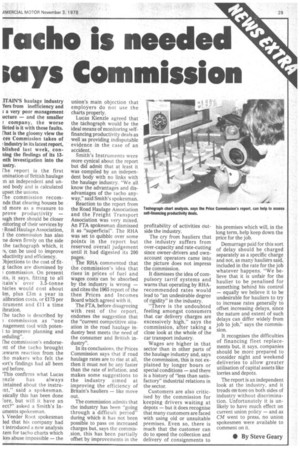radio is needed lays Commission
Page 31

If you've noticed an error in this article please click here to report it so we can fix it.
HAIN'S haulage industry Ters from inefficiency and ; a very poor management ucture — and the smaller ! company, the worse licted is it with these faults.
Chat is the gloomy view the ces .Commission takes of Industry in its latest report, blished last week, con ning the findings of its 13nth investigation into the lustry.
['he report is the first imination of British haulage m an independent and unsed body and is calculated upset the unions.
Che commission recomnds that clearing houses be ?,d more as a measure to prove productivity — )ugh there should be closer mitoring of their services by !Road Haulage Association, the commission has also ne down firmly on the side the tachograph which, it is, can be used to improve )ductivity and efficiency.
Jbjections to the cost of fitg tachos are dismissed by ) commission. On present ;ts, it says, fitting to all Ltam's' over 3.5-tonne hicles would cost about im, plus Om a year in alibration costs, or £175 per ,trument and El 1 a time ibration.
['he tacho is described by ?, commission as "one .nagement tool with poten1 to improve planning and ieduling".
['he commission's endorseTit of the tacho brought :ewarm reaction from the :ho makers who felt the tort's findings had all been ird before.
This confirms what Lucas nzle has always intained about the instrumt," said a spokesman.
lsically this has been done fore, but will it have an ect?" asked a Smith's Inuments spokesman.
Veeder Root spokesman led that his company had t introduced a new analysis tern for tacho charts which kes abuse impossible — the union's main, objection that employers do not use the charts properly.
Lucas Kienzle agreed that' the tachograph would be the ideal means of monitoring selffinancing productivity deals as well as providing indisputable evidence in the case of an accident.
Smith's Instruments were more cynical about the report but did admit that at least it was compiled by an indepen dent body with no links with the haulage industry. "Vie all know the advantages and dis advantages of the tacho anyway," said Smith's spokesman. Reaction to the report from the Road Haulage Association and the Freight Transport ssociation was very mixed. n ETA spokesman dismissed it as "superficial". The RHA as set to quibble over some points in the report but eserved overall judgement ntil it had digested its 200 ages. tlThe RHA, commented that he commission's idea that irises in prices of fuel and ages costs . can be absorbed y the industry is wrong — lid cites the 1965 report of the then Prices and Incomes Board which agreed with it.
The FTA, before disagreeing with rest of the report, endorses the suggestion that the "current competitive situation in the road haulage in dustry best meets the need of the consumer and British industry".
In its conclusions, the Prices Commission says that if road haulage rates are to rise at all, then it must not be any faster than the rate of inflation, and makes some suggestions to the industry aimed at improving the efficiency of Britain's hauliers — like move out.
The commission admits that the industry has been "going through a difficult period' during which it has not been possible to pass on increased charges but, says the commission, this has been partially offset by improvements in the profitability of activities Outside the industry.
The cry from hauliers that the industry suffers from over-capacity and rate-cutting since owner-drivers and ownaccount operators came into the picture does not impress the commission.
It dismisses the idea of compulsory tarrif systems and warns that operating by RHArecommended rates would lead to "an undesirable degree of rigidity" in the industry.
"There is the undoubted feeling amongst consumers that car delivery charges are excessively high," says the commission, after taking a close look at the whole of the car transport industry.
Wages are higher in that sector than in other parts of the haulage industry and, says the commission, this is not explained by longer hours or special conditions — and there is a history of "less than satisfactory" industrial relations in the sector.
Customers are also criticised by the commission for keeping drivers waiting at depots — but it does recognise that many customers are faced with using old or unsuitable premises. Even so, there is much that the customer can do to speed the collection and delivery of consignments to his premises which will, in the long term, help keep down the price for the job.
Demurrage paid for this sort of delay should be charged separately as a specific charge and not, as many hauliers said, included in the rate for the job whatever happens. "We believe that it is unfair for the haulier to be penalised for something behind his control — equally we believe it to be undesirable for hauliers to try to increase rates generally to offset increasing delays, since the nature and extent of such delays can differ widely from job to job," says the commission.
It recognises the difficulties of financing fleet replacements but, it says, companies should be more prepared to consider night and weekend deliveries to allow greater utilisation of capital assets like lorries and depots.
The report is an independent look at the industry, and it treads on toes. on both sides of industry without discrimination. Unfortunately it is unlikely to have much effect on current union policy — and as CM went to press, no union spokesmen were available to comment on it.




























































































































